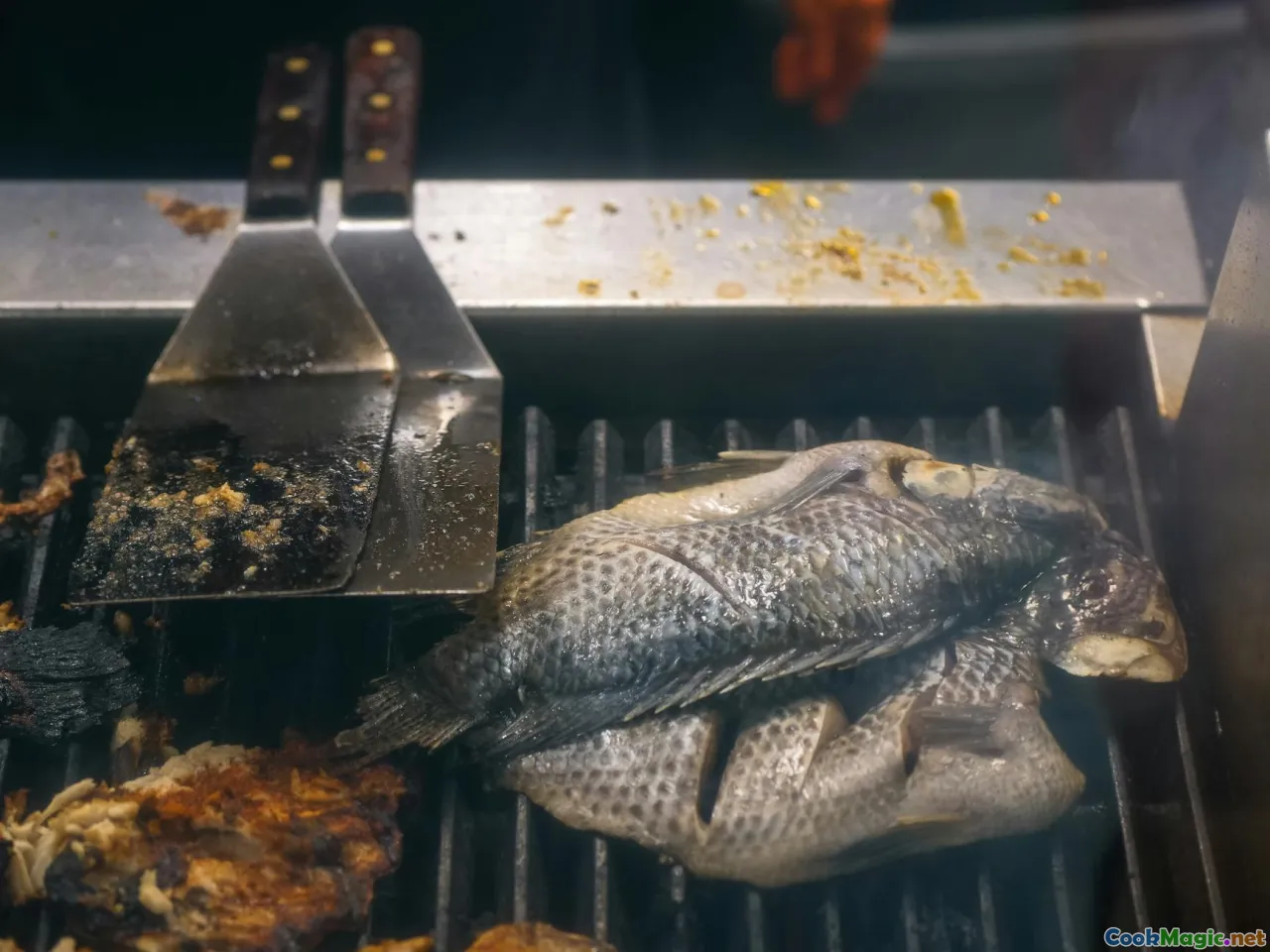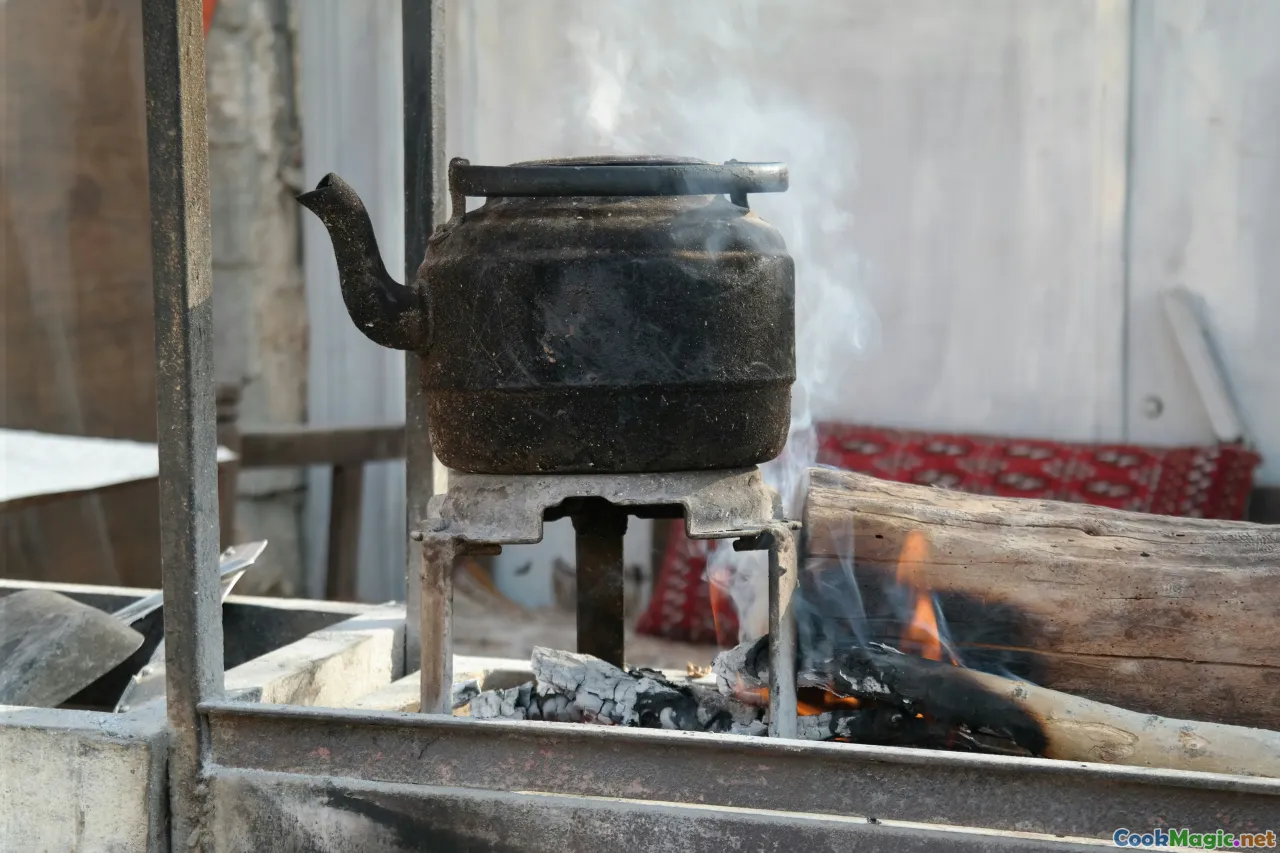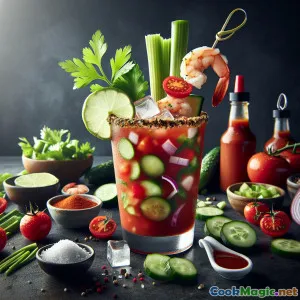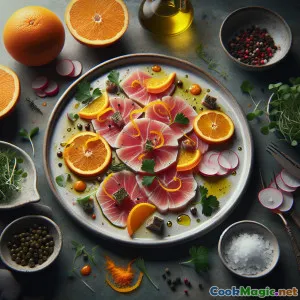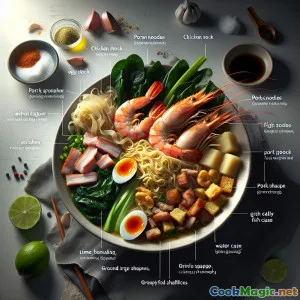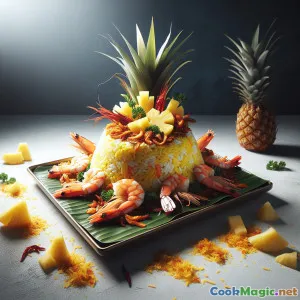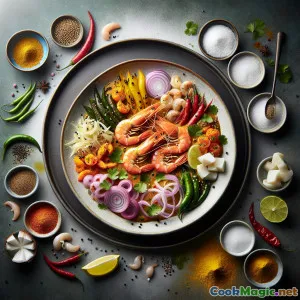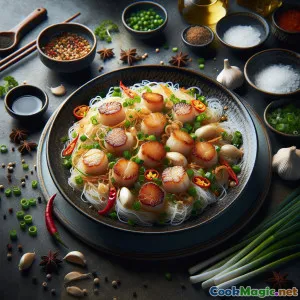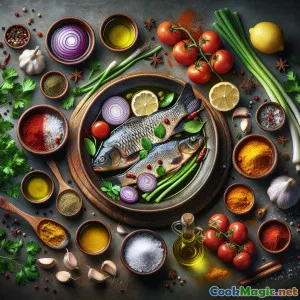
Món Nướng Cá Sông Masgouf của Iraq: Bữa Tiệc Truyền Thống
(Iraqi Masgouf: Traditional Grilled River Carp Feast)
(0 Đánh giá)0
354
tháng 7 16, 2025
Báo cáo sự cố
Nguyên liệu
-
1.5 kg Cá chép sông tươi
(Gutted, scaled, head and tail on, local preferred)
-
3 tbsp Dầu ô liu
(Dùng để phết và ướp)
-
2 tbsp Nước cốt chanh tươi
(Plus extra for serving)
-
2 tbsp Bột me
(Adds signature tartness)
-
1 tsp Bột nghệ xay
(For color and warmth)
-
1 tsp Tiêu đen xay
(freshly ground if possible)
-
2 tsp Muối biển thô
Tỏi đã nghiền nát, 4
-
1 tbsp Mật ong chà là
(Balances tamarind with sweetness)
-
2 medium Cà chua tươi xắt nhỏ
(Roughly diced, for stuffing and garnish)
-
1 medium Hành tây trắng thái lát
(For stuffing and serving)
-
2 tbsp Mùi tây tươi thái nhỏ
-
1 tsp Chanh khô (loomi), nghiền nát
(For smoky, citric flair; can substitute with lemon zest)
(Gutted, scaled, head and tail on, local preferred)
(Dùng để phết và ướp)
(Plus extra for serving)
(Adds signature tartness)
(For color and warmth)
(freshly ground if possible)
(Balances tamarind with sweetness)
(Roughly diced, for stuffing and garnish)
(For stuffing and serving)
(For smoky, citric flair; can substitute with lemon zest)
Dinh dưỡng
- Khẩu phần: 4
- Kích thước khẩu phần: 1 whole split fish (~350g per serving)
- Calories: 500 kcal
- Carbohydrates: 18 g
- Protein: 42 g
- Fat: 28 g
- Fiber: 3 g
- Sugar: 7 g
- Sodium: 790 mg
- Cholesterol: 98 mg
- Calcium: 120 mg
- Iron: 2.7 mg
Hướng dẫn
-
1 - Prepare the Fish:
Thoroughly wash and pat the carp dry. Split the fish down the backbone so it opens flat resembling a butterfly, keeping the skin and bones intact. Remove innards. Score deeply every few centimeters to allow the marinade to penetrate.
-
2 - Make the Marinade:
Gently whisk together olive oil, fresh lemon juice, tamarind paste, turmeric, black pepper, salt, garlic, and date syrup (if using) in a bowl.
-
3 - Marinate the Carp:
Rub the marinade liberally over both sides and deep into the slits of the fish. Let the carp rest for at least 15 minutes.
-
4 - Stuff & Garnish:
Tuck diced tomatoes and onions into the split fish cavity. Sprinkle with parsley and loomi if using.
-
5 - Light Your Fire:
Prepare a wood fire (ideally using citrus or fruit wood) to cook over embers. An outdoor open grill or home oven (grill mode) may be used.
-
6 - Grill the Fish:
Set fish skin-side down upright or flat on a grill rack over hot fire embers. Slow-grill, basting occasionally, until skin crisps, flesh is golden and fragrant—about 45–60 minutes depending on heat and thickness. Rotate for even cooking.
-
7 - Finish & Serve:
Carefully transfer to a platter. Squeeze additional lemon juice, scatter fresh parsley, and serve piping hot with plenty of flatbread, sumac onions, and seasonal pickles.
Thoroughly wash and pat the carp dry. Split the fish down the backbone so it opens flat resembling a butterfly, keeping the skin and bones intact. Remove innards. Score deeply every few centimeters to allow the marinade to penetrate.
Gently whisk together olive oil, fresh lemon juice, tamarind paste, turmeric, black pepper, salt, garlic, and date syrup (if using) in a bowl.
Rub the marinade liberally over both sides and deep into the slits of the fish. Let the carp rest for at least 15 minutes.
Tuck diced tomatoes and onions into the split fish cavity. Sprinkle with parsley and loomi if using.
Prepare a wood fire (ideally using citrus or fruit wood) to cook over embers. An outdoor open grill or home oven (grill mode) may be used.
Set fish skin-side down upright or flat on a grill rack over hot fire embers. Slow-grill, basting occasionally, until skin crisps, flesh is golden and fragrant—about 45–60 minutes depending on heat and thickness. Rotate for even cooking.
Carefully transfer to a platter. Squeeze additional lemon juice, scatter fresh parsley, and serve piping hot with plenty of flatbread, sumac onions, and seasonal pickles.
Thông tin thêm về: Món Nướng Cá Sông Masgouf của Iraq: Bữa Tiệc Truyền Thống
Baghdad Style Masgouf River Carp: More Than a Feast
Of all the national dishes associated with Iraq, none resound as poetically as Masgouf—a testament to the inimitable union between river, fire, and family. As the mighty Tigris and Euphrates meander through the heart of Mesopotamia, they deliver one of Iraq’s proudest culinary treasures: the ancient river carp. In the hustle of modern Baghdad, as in sleepy riverside towns, preparing Masgouf remains both an art and a celebration, steeped in stories as old as Babylon itself.
History & Deep Roots
Masgouf dates back to at least Sumerian and Assyrian eras. This dish is uniquely Mesopotamian—the carp are native to the region’s slow rivers, prized for their tender, fatty flesh that remains firm throughout slow roasting. Holiday gatherings and diplomatic meetings alike have featured Masgouf, often prepared right on the banks of the river or in garden courtyards where the flavors of wood smoke permeate everything. The split, butterfly-gutted carp, often displayed in glass chillers to entice passersby, is as much a part of Baghdad’s cityscape as its bustling souks and minaret-dotted skyline.
Distinctiveness & Preparation
What sets Baghdad Style Masgouf apart? First, the fish: always river carp, chosen for optimal fattiness. It’s cleaned but left whole and flat, splayed out like an open book—this presentation ensures even heat absorptiamid skewering or grating. Critical too is the marinade: lemon, tamarind or pomegranate molasses, and aromatic garlic craft a balanced tanginess and depth. For a subtle sweetness and authentic touch, date syrup may be drizzled in; this also nods to Iraq’s most beloved fruit.
One of the most beautiful rituals is the grilling method. Instead of being laid directly over the flame, the fish is traditionally mounted upright in a custom rack or propped over wood coals, skin-side out, so the thick layer of fat and bone protects the flesh from burning. Sizzling gently, the marinade caramelizes; slow, radiant heat infuses a delicate smoky aroma, while the frequent basting creates an irresistible, slightly crisp skin. Occasionally, cooks toss branches of lemon or orange wood into the fire, heightening the fragrance and linking the dish ever more deeply with its lush, riverine homeland.
Serving & Cultural Significance
Masgouf is not simply food—it’s occasion, spectacle, and communal gathering. Traditionally, diners tear off flatbread by hand, using it to pick up hot, meltingly moist fish loaded with caramelized edges and tangy bites of tomato. Onions tossed with sumac, pickled vegetables, and a squeeze of fresh lemon typically accompany.
In contemporary Iraq, Masgouf restaurants often point their grills toward the passing foot traffic to tantalize with the scent of slow-roasting fish—even local poetry refers to the aroma as an announcement of hospitality. Sharing Masgouf emphasizes patience; the slow grilling is an emblem of unhurried enjoyment, and hospitality often unfolds around long, low tables set by the riverside.
Tips & Creative Twists
- Choose Freshness: The best Masgouf comes from the freshest fish. If river carp is unavailable, opt for a meaty freshwater fish like grass carp, catfish, or tilapia, but always select whole, fat-laden specimens.
- Fire Secrets: True Masgouf uses fruit wood for smoke. In the absence of an open wood fire, simulate by adding soaked wood chips to charcoal or oven grilling with wood planks.
- No Tamarind?: Substitute pomegranate molasses, lemon zest, or a mix for that signature tartness.
- Indoor Version: For home cooks without the means to grill over embers, an indoor broiler or grill pan gives good results—watch closely to avoid overcooking!
- Personal Note: Having prepared Masgouf for Iraqi friends, I’m always amazed by the 'silent respect' that takes over as first bites are savored—proof that even today, some recipes remain poetic links to homeland and hearth.
In Closing
Making Baghdad Style Masgouf River Carp honors a tradition that transcends food, linking conviviality, respect for ingredients, and Mesopotamian identity in each luscious, smoky bite. Invite your diners to eat slowly, with hands if they please, and to share stories amid the aromas of lemon, flame, and history.

